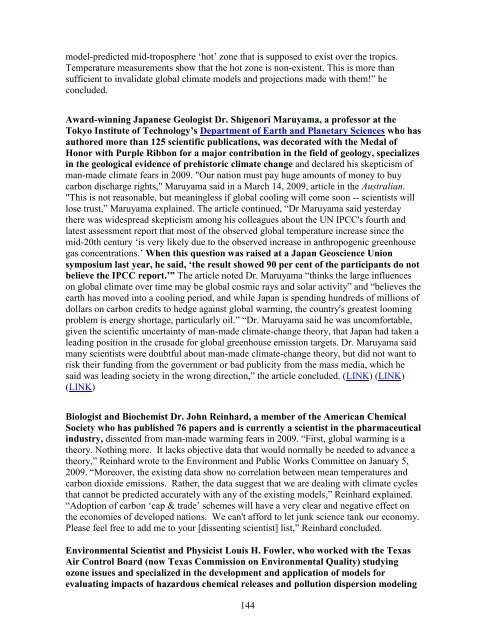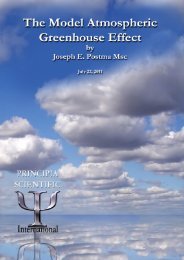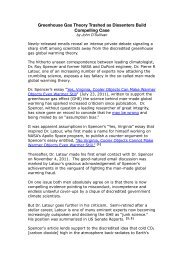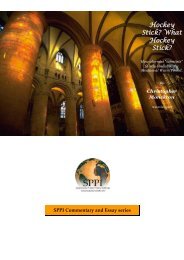Than 1000 International Scientists Dissent Over Man-Made Global ...
Than 1000 International Scientists Dissent Over Man-Made Global ...
Than 1000 International Scientists Dissent Over Man-Made Global ...
You also want an ePaper? Increase the reach of your titles
YUMPU automatically turns print PDFs into web optimized ePapers that Google loves.
model-predicted mid-troposphere ‗hot‘ zone that is supposed to exist over the tropics.<br />
Temperature measurements show that the hot zone is non-existent. This is more than<br />
sufficient to invalidate global climate models and projections made with them!‖ he<br />
concluded.<br />
Award-winning Japanese Geologist Dr. Shigenori Maruyama, a professor at the<br />
Tokyo Institute of Technology‟s Department of Earth and Planetary Sciences who has<br />
authored more than 125 scientific publications, was decorated with the Medal of<br />
Honor with Purple Ribbon for a major contribution in the field of geology, specializes<br />
in the geological evidence of prehistoric climate change and declared his skepticism of<br />
man-made climate fears in 2009. "Our nation must pay huge amounts of money to buy<br />
carbon discharge rights," Maruyama said in a March 14, 2009, article in the Australian.<br />
"This is not reasonable, but meaningless if global cooling will come soon -- scientists will<br />
lose trust,‖ Maruyama explained. The article continued, ―Dr Maruyama said yesterday<br />
there was widespread skepticism among his colleagues about the UN IPCC's fourth and<br />
latest assessment report that most of the observed global temperature increase since the<br />
mid-20th century ‗is very likely due to the observed increase in anthropogenic greenhouse<br />
gas concentrations.‘ When this question was raised at a Japan Geoscience Union<br />
symposium last year, he said, „the result showed 90 per cent of the participants do not<br />
believe the IPCC report.‟” The article noted Dr. Maruyama ―thinks the large influences<br />
on global climate over time may be global cosmic rays and solar activity‖ and ―believes the<br />
earth has moved into a cooling period, and while Japan is spending hundreds of millions of<br />
dollars on carbon credits to hedge against global warming, the country's greatest looming<br />
problem is energy shortage, particularly oil.‖ ―Dr. Maruyama said he was uncomfortable,<br />
given the scientific uncertainty of man-made climate-change theory, that Japan had taken a<br />
leading position in the crusade for global greenhouse emission targets. Dr. Maruyama said<br />
many scientists were doubtful about man-made climate-change theory, but did not want to<br />
risk their funding from the government or bad publicity from the mass media, which he<br />
said was leading society in the wrong direction,‖ the article concluded. (LINK) (LINK)<br />
(LINK)<br />
Biologist and Biochemist Dr. John Reinhard, a member of the American Chemical<br />
Society who has published 76 papers and is currently a scientist in the pharmaceutical<br />
industry, dissented from man-made warming fears in 2009. ―First, global warming is a<br />
theory. Nothing more. It lacks objective data that would normally be needed to advance a<br />
theory,‖ Reinhard wrote to the Environment and Public Works Committee on January 5,<br />
2009. ―Moreover, the existing data show no correlation between mean temperatures and<br />
carbon dioxide emissions. Rather, the data suggest that we are dealing with climate cycles<br />
that cannot be predicted accurately with any of the existing models,‖ Reinhard explained.<br />
―Adoption of carbon ‗cap & trade‘ schemes will have a very clear and negative effect on<br />
the economies of developed nations. We can't afford to let junk science tank our economy.<br />
Please feel free to add me to your [dissenting scientist] list,‖ Reinhard concluded.<br />
Environmental Scientist and Physicist Louis H. Fowler, who worked with the Texas<br />
Air Control Board (now Texas Commission on Environmental Quality) studying<br />
ozone issues and specialized in the development and application of models for<br />
evaluating impacts of hazardous chemical releases and pollution dispersion modeling<br />
144





